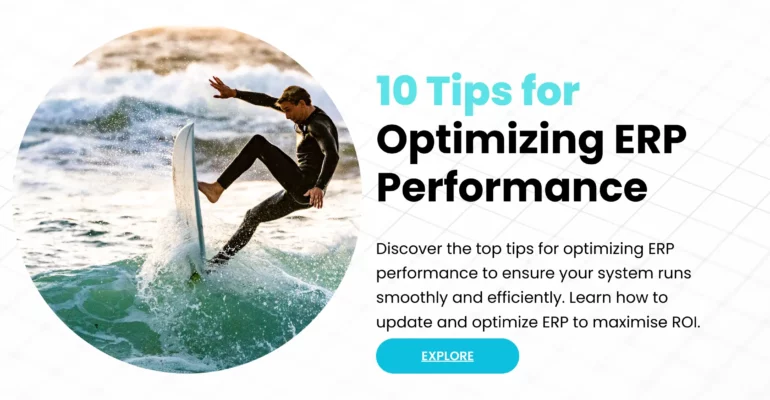10 Tips for Optimizing ERP Performance

Implementing an ERP (Enterprise Resource Planning) system can be a game-changer for your business, streamlining operations, improving efficiency, and providing real-time insights. An ERP system integrates various business processes and functions, from finance and HR to supply chain and inventory management, into a single unified system. This integration allows for better data visibility, improved decision-making, and enhanced operational efficiency, making it an invaluable tool for businesses aiming to stay competitive in today’s fast-paced market.
However, the true value of an ERP system is realized only when it is performing at its best. Optimizing ERP Performance is essential to prevent sluggish performance, data bottlenecks, and operational inefficiencies that can negate the benefits it is supposed to bring. Regular maintenance, updates, and fine-tuning are crucial to keep the system running smoothly and to adapt to the ever-changing business environment. Without proper optimization, businesses may face challenges such as system downtime, slow data processing, and inadequate user experiences, which can hamper productivity and growth.

10 Tips for Optimizing ERP Performance
To ensure your ERP system delivers maximum value, it is crucial to adopt best practices for optimizing ERP performance. This involves not just technical tweaks but also aligning the system with your business goals, training users effectively, and continuously monitoring performance. By taking a proactive approach to ERP optimization, you can enhance system efficiency, ensure seamless operations, and ultimately drive better business outcomes. Here are ten tips to help you maximize the performance of your ERP system.
1. Regularly Update Your ERP Software
Keeping your ERP software up-to-date ensures you have access to the latest features, security patches, and performance improvements. Regular updates can prevent compatibility issues and improve the overall efficiency of your system. Ensure that updates are scheduled during off-peak hours to minimize disruptions and test them in a controlled environment before full deployment.
2. Optimize Your Database
The database is the backbone of your ERP system. Regularly performing database maintenance tasks such as indexing, defragmentation, and optimization can significantly enhance performance. Consider using tools that monitor and automatically optimize your database. Additionally, ensure that database servers are adequately provisioned with enough memory and CPU resources to handle peak loads.
3. Implement Effective Data Management Practices
Over time, ERP systems can accumulate vast amounts of data, which can slow down performance. Implement data archiving and purging policies to keep your database lean and efficient. Ensure that only relevant and necessary data is retained. Use data compression techniques where appropriate to save storage space and improve access times.
4. Enhance Hardware and Infrastructure
Investing in robust hardware and network infrastructure can have a profound impact on ERP performance. Ensure that your servers, storage devices, and network components are capable of handling the demands of your ERP system. Regularly review and upgrade hardware components to keep up with increasing data loads and user demands. Consider adopting SSDs for faster data retrieval and reducing latency.
5. Monitor System Performance
Use monitoring tools to track the performance of your ERP system continuously. Regular monitoring helps identify bottlenecks, resource-intensive processes, and potential issues before they impact overall performance. Implement alerts and notifications for critical performance metrics. Create dashboards that provide real-time insights into system health and performance, enabling quick responses to any issues.
6. Optimize Customizations and Integrations
Customizations and third-party integrations can affect ERP performance. Ensure that custom code is optimized and follows best practices. Regularly review and update integrations to ensure they do not introduce performance bottlenecks. Conduct performance testing for any new customizations or integrations before going live to identify and resolve potential issues.
7. Train Users Effectively
User training is essential for optimal ERP performance. Educate users on best practices, efficient workflows, and proper system usage. Well-trained users are less likely to make mistakes that can lead to performance issues. Offer regular training sessions and provide accessible resources such as user manuals, video tutorials, and help desks to support users.
8. Implement Load Balancing
For larger organizations, implementing load balancing can distribute the workload across multiple servers, improving performance and reliability. Load balancing ensures that no single server becomes a bottleneck, leading to more efficient resource utilization. Use load balancing strategies such as round-robin, least connections, or IP hash to distribute traffic effectively.
9. Regularly Review and Audit Security Settings
Security measures can sometimes impact performance. Regularly review and audit your security settings to ensure they are not overly restrictive while still protecting your data. Optimize security protocols to balance safety and performance. Implement role-based access controls to minimize unnecessary access to sensitive data and reduce the risk of performance issues.
10. Leverage ERP Performance Tools and Services
Many ERP vendors offer performance tools and services designed to optimize system performance. These tools can analyze your ERP environment, identify performance issues, and provide recommendations for improvement. Consider leveraging these resources for expert guidance. Additionally, engage with your ERP vendor’s support team for insights and best practices tailored to your specific system.
Conclusion
Optimizing your ERP system’s performance is an ongoing process that involves regular maintenance, monitoring, and updates. By implementing these ten tips, you can ensure that your ERP system runs smoothly, supports your business operations effectively, and provides the maximum return on investment. Remember, a well-optimized ERP system is key to maintaining a competitive edge in today’s fast-paced business environment.
For expert assistance with ERP optimization or to learn more about how we can help improve your ERP system’s performance, contact us today!
We’re here to help! Reach out to us via email at info@15.206.92.4 or give us a call at +91 9841205845.
Stay connected with us on LinkedIn, YouTube, Facebook, Twitter, Pinterest, or Instagram.for regular updates on ERP, CRM, HRMS, and other relevant topics.
Don’t hesitate! Embrace the power of ERP solutions and watch your business reach new heights!
Image Credit: Canva



Comments (3)
Tania
Great article. Very informative.
Orion
Excellent.
Linnea
The contents are vey informative.